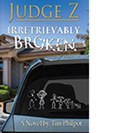Anne Reed
AFA Journal staff writer
Above, Judge Timothy Philpot
Editor’s Note: AFA Journal writer Anne Reed shadowed Judge Timothy Philpot for insight into how the controversial judge mounted a campaign to save marriages and ran into staggering cultural roadblocks.
May 2020 – Divorce was once a rarity. But a cosmic shift took place in the minds of America’s people after Gov. Ronald Reagan (R-CA) signed the first so called no-fault divorce bill in 1969. Believing it to be a way of reducing unnecessary conflict and false accusations in divorce court, he later admitted signing that piece of legislation was one of the biggest mistakes of his political career.
Divorce spread like wildfire, and the foundation of God-ordained marital commitment crumbled in the decades that followed. Billboards today advertise for “quick and easy” divorces.
While stipulations, interpretations, and enforcement mechanisms vary from state to state, the honorable, black-robed decision-maker has become, in effect, a rubber stamp.
 Judge Timothy Philpot (photo right), who served as family court circuit judge in Fayette County, Kentucky, from 2004 to 2017, became increasingly troubled by the closed cases slapped on his desk, necessitating only a quick glance and three signatures to end it all.
Judge Timothy Philpot (photo right), who served as family court circuit judge in Fayette County, Kentucky, from 2004 to 2017, became increasingly troubled by the closed cases slapped on his desk, necessitating only a quick glance and three signatures to end it all.
“If it’s purely a matter of filling out forms, why do we need a judge at all?” Philpot asked himself. “Why not just let the county clerk sign the documents?”
In late 2015, he tirelessly examined the Kentucky marriage statute and discovered a stipulation that changed the way he approached divorce cases. The statute requires that, before granting a divorce, the courts find the marriage irretrievably broken – meaning, there is no reasonable prospect of reconciliation. It further clarifies that if only one party has claimed irretrievable brokenness, and the other party has denied it, “the court, after hearing (emphasis added), shall make a finding whether the marriage is irretrievably broken.”
After years of granting quick and easy divorces like the other judges, Philpot went out on a limb and initiated Irretrievably Broken Hearings (IBHs), wherein both parties were heard. Philpot simply enforced state law. But he soon came under intense fire from local and national media, and a complaint was filed with the Judicial Conduct Commission (JCC).
The interrogation
“In theory, the JCC could have taken my pension away, so it was actually pretty scary,” Philpot told AFA Journal. He knew the alternatives: a private reprimand, a public reprimand, actual charges, or ultimate suspension.
Suddenly, the tables had been turned, and the judge was clearly under interrogation:
“Judge, on what authority are you conducting these hearings?”
“We have no-fault divorce in Kentucky. So, what are you doing, Judge?”
Certain that he was acting within the law, Philpot quoted the Kentucky statute. “I am the only judge doing it, but that doesn’t mean I’m wrong,” he said emphatically.
Later that same day, when Philpot received a fax with a proposed agreement for a public reprimand, he was surprised, relieved, and amused. The JCC complained of his inconsistency by only requiring couples with children to participate in the special hearings.
“I signed it that day before they could change their minds,” Philpot said with a smile. “And in January 2017, I started doing IBHs in every divorce case – not just in cases with children. Whoever filed the complaint thought they were stopping me, but instead it tripled the number of hearings. Only the Lord can do that.”
Lives, not numbers
From January 2016 to December 2017, Philpot conducted 215 IBHs. Of the cases involving children, one or both spouses were ambivalent (had mixed feelings) 33% of the time, and in cases without children, ambivalence was present 23% of the time. Forty-five couples were sent to a counselor trained to help them comprehend whether the path to marital healing was possible.
“I never, not one single time, refused a divorce,” Philpot explained. “An IBH simply takes the matter of divorce off the expressway and into the neighborhood, with ‘children at play’ signs along the way.” The health of a troubled marriage is often restored if both partners are willing to stop, listen, and work toward restoration.
In addition to the IBHs, he required couples with children to participate in a four-hour divorce education class.
Contested hearings
When Philpot originally discovered a way of putting the law into practice, he had high hopes for getting others on board. He decided to assemble a large group of divorce attorneys to show them why the IBHs were both lawful and advantageous.
He invited nationally renowned marriage expert Bill Doherty, Ph.D., who trains therapists and family lawyers concerning “discernment counseling,” the protocol he designed for situations when one spouse is leaning out of the marriage and the other is desiring to save it. He presented his thorough research on divorce cases involving ambivalence and provided documented evidence of positive outcomes when “a pause” is inserted in the process.
“They did everything but boo us both off the stage,” said Philpot. “We were both incredibly surprised by their negative reaction.”
Philpot continually faced fierce opposition on seemingly every front, including an ongoing media backlash and three more judicial conduct complaints – the last of which was dismissed months after his retirement in December 2017.
His judicial peers refused to consider adding IBHs to divorce cases, seeing them as an unnecessary weight on their overbearing schedules. Ironically, after more than a year of consistently applying the law, Philpot became puzzled by the lightness of his schedule compared to other family court judges. His peers, who were still operating the “old way,” were perhaps more perplexed than he was.
He was so busy defending himself against judicial complaints, he had somehow missed an important shift that had taken place. Contested divorces had disappeared from his docket.
Marriages were either being saved or the parties involved were reaching mutual agreement. The time-consuming process of working through accusations and conflict in court had been eliminated.
Successful failure
Though other Fayette County judges never followed in Philpot’s footsteps by conducting IBHs, they all began requiring parents to complete divorce classes. Philpot considers that a significant victory.
Though the journey of creating a slower, more thoughtful path for those considering divorce has been arduous and lonely, it has been worth the effort for Philpot. He nicknamed the IBH project “a successful failure” after the Apollo 13 mission.
“They were supposed to land on the moon,” he explained. “They never did, but at least they got back alive. Once in a while, we help a few people. People are actually thinking and talking about the term, ‘irretrievably broken,’ and it is empowering people to think about slowing down the process.” 
One couple’s story
Don Sizemore, a professional counselor for more than 30 years, helped Judge Philpot implement the project to save marriage and served as a discernment counseling referral source.
“I’m thankful that someone slowed down the train,” Sizemore told AFA Journal. “I think that’s the main thing – that people get an opportunity to sit down with a professional that knows how to help them find a path forward.”
Katrina and Michael had been married for seven years and had five children when they appeared before Judge Philpot, who referred them to Sizemore for one two-hour session of discernment counseling. After that session, they agreed to follow-up counseling.
The following is an interview conducted by Sizemore:
Don Sizemore: How did your divorce [proceedings] come about?
Katrina: Certain things happened during the marriage that broke my trust. It was at the point that I couldn’t do it anymore. And so, I was the one who asked for the divorce.
Michael: It was hard because I didn’t want it.
DS: When [Judge Philpot] ordered you to go to one two-hour session, what were your feelings?
M: I was glad, but she was not happy.
K: I knew everything we had been through up to that point, and I wasn’t very happy about someone trying to dictate what we were going to do.
DS: So, you didn’t have much hope?
K: I just wanted it over. I didn’t really want to be there.
DS: If you had not had the hearing with Judge Philpot, what do you think would have happened.
M: I think we would be divorced.
K: I think so… those papers would have been signed. We had the choice to file the motion to actually end [the divorce proceedings] or let [them] expire. So, we filed the motion. We went the extra step.
DS: That is really cool. Why did you take the extra step?
K: No going back! I didn’t want that hanging out there. If we went through something that got hard, I didn’t want the ‘out.’
DS: What changed your heart so that you didn’t want the out?
K: Part of it was that I was seeing his commitment to our family, and to us. Part of it was humbling myself and recognizing my own issues of insecurity, anxiety. Though actions on his part fueled them, [my issues] were still there, and I had to own them. If I owned them that means my issues weren’t any different than his issues. If you look at sin, it’s all the same.
If he’s going to forgive me and love me then I forgive him and love him. There’s been no turning back.
____________________
 Philpot novel addresses issues
Philpot novel addresses issues
Judge Z: Irretrievably Broken, published in 2016, is Tim Philpot’s novel spotlighting the death of marriage in American culture. The pedagogical novel gave him a platform to express both legal and biblical truths in a non-threatening, yet eye-opening manner.
In this entertaining narrative, Judge Atticus Zenas struggles with life, faith, and the trauma of losing his wife to cancer. Added to his personal challenges are the sad stories he encounters as a judge – neglected children, domestic violence, the ease of no-fault divorce, fatherless homes.
Then Judge Z discovers that his state’s divorce law calls for counsel or intervention if either spouse believes the marriage can be saved.
When he begins to enforce that law, he envisions the emergence of a campaign that will save marriages. Instead, he is stunned as his peers file legal complaints against him, the media smears him, and many couples still demand easy divorce.
But Judge Z is not one to back away from his convictions, and he tackles the issue head on.
Judge Z is available at online and retail booksellers.
AFAJ caution: The novel includes a few mild vulgarities and one brief sexually suggestive passage.
Review by Randall Murphree
____________________
Timothy and Sue Philpot have been married since 1971. Before becoming a judge, he was a trial lawyer, state senator, and president of CBMC International, a team of business and professional men and women in 96 countries who share a passion to see the global marketplace transformed by the gospel.
Philpot is available to speak at marriage conferences, retreats, and other events. Email him at timphilpot67@gmail.com or call 859.227.3093.